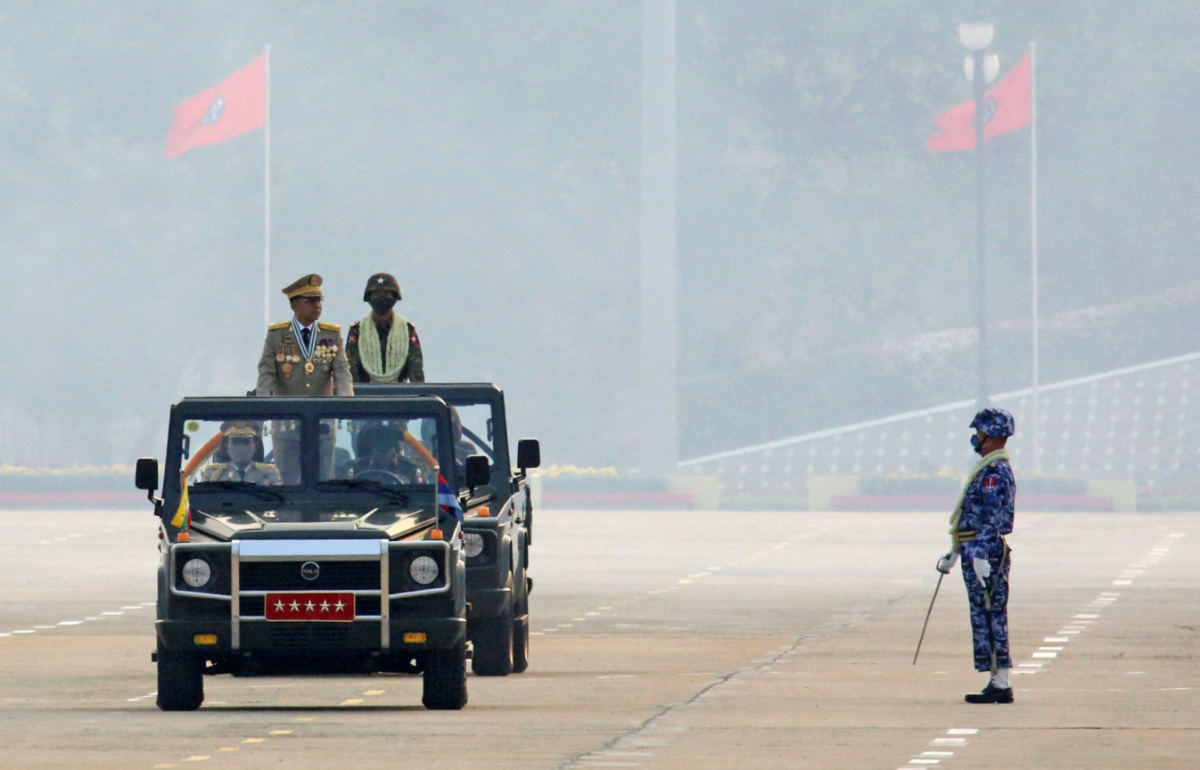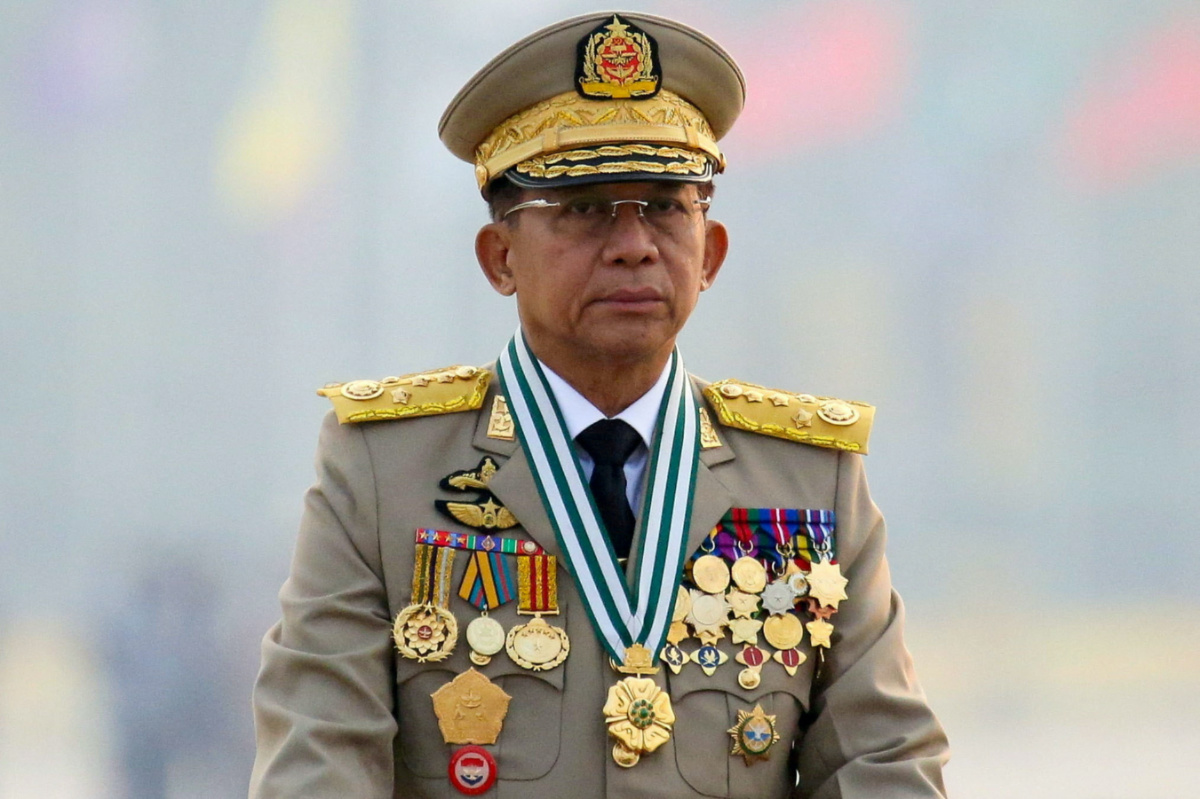
Reuters correspondents report on the situation in Myanmar, three years after a military coup…
In mid-January, at a small gathering in a cantonment town in Myanmar, hard line pro-military monk Pauk Kotaw suggested that the country’s junta chief Min Aung Hlaing step down and his deputy take over. The crowd cheered in agreement, according to videos of the event posted on social media.
Online, pro-military journalists and bloggers have been similarly direct. “He should resign as commander-in-chief,” Ko Maung Maung, a pro-military YouTuber said in a post.

Myanmar’s junta chief Senior General Min Aung Hlaing, who ousted the elected government in a coup on 1st February, 2021, presides an army parade on Armed Forces Day in Naypyitaw, Myanmar, on 27th March, 2021. PICTURE: Reuters/Stringer
Such public utterances against Myanmar’s powerful junta leader and the chief of its armed forces would have been unthinkable just a few months ago.
But after seizing power in a dawn coup d’etat on on 1st February, 2021, Min Aung Hlaing finds himself in his weakest position since deposing the democratically elected government of Nobel laureate Aung San Suu Kyi.
“There is deep frustration within the military, which extends to Min Aung Hlaing personally. Some would certainly love to see him go.”
– a diplomat in South-East Asia told Reuters who asked not to be named.
Questions about the 67-year-old’s leadership are being asked after a series of battlefield defeats for the military in a sweeping offensive by rebel groups that started in October, dubbed Operation 1027.
So far, the junta has lost control of at least 35 towns, according to the media collective Myanmar Peace Monitor, although a Beijing-mediated ceasefire has halted clashes near the Chinese border. In other parts, fighting continues.
The junta, which has not addressed specifics about battlefield defeats, has previously acknowledged some loss of control of territory. On Wednesday, on the eve of the coup anniversary, Min Aung Hlaing extended a state of emergency for another six months to allow the military to carry out tasks to “bring the nation to a normal state of stability and peace”.
“There is deep frustration within the military, which extends to Min Aung Hlaing personally,” a diplomat in South-East Asia told Reuters, asking not to be named. “Some would certainly love to see him go.”
The military is also struggling to recruit soldiers and forcing non-combat personnel to the frontline – all causing blowback for Min Aung Hlaing, the diplomat said.
A junta spokesman did not respond to calls from Reuters seeking comment.
To be sure, the army’s losses on the battlefield may not lead to a collapse and it is unclear if or how Min Aung Hlaing could be pushed out or who may replace him, including his current deputy Soe Win.
MYANMAR’S EMBATTLED JUNTA EXTENDS EMERGENCY RULE ON EVE OF COUP ANNIVERSARY
Myanmar’s military rulers on Wednesday extended a state of emergency in place since a 2021 coup, as the junta battles to contain a bloody, pro-democracy rebellion that has severely tested its ability to govern.
Junta chief Min Aung Hlaing deemed it necessary to extend emergency rule for a further six months to undertake tasks necessary “to bring the nation to a normal state of stability and peace,” military-run media outlet Myawaddy said on Telegram.
The generals are facing their biggest challenge since first taking power in the former British colony in 1962, with a youth-led pro-democracy uprising morphing into an armed resistance movement after a lethal crackdown on a wave of protests and post-coup dissent.
The junta has deployed heavy artillery and fighter jets to try to suppress militias allied with a shadow government and ethnic minority armies, several of which launched a coordinated offensive in October that stunned the military and has dented its battlefield credibility.
Marking the coup anniversary, UN Secretary-General Antonio Guterres stressed “the urgency of forging a path towards a democratic transition with a return to civilian rule,” said UN spokesperson Stephane Dujarric.
“An inclusive solution to this crisis requires conditions that permit the people of Myanmar to exercise their human rights freely and peacefully. The military’s campaign of violence targeting civilians and political repression must end, and those responsible be held to account,” Dujarric said.
About 2.3 million people have been displaced, according to the United Nations, while efforts by Myanmar’s South-East Asian neighbours to initiate dialogue have seen no progress, with the junta refusing to negotiate with what it calls “terrorists”.
However, the events have damaged both Min Aung Hlaing’s standing and that of the Myanmar military, known as the Tatmadaw, which the UN has accused of conducting systematic human rights violations in the country.
“Its poor showing on the battlefield is seen as shameful by nationalists and other military supporters who have launched unprecedented public criticism of Commander-in-Chief Min Aung Hlaing’s leadership,” said Richard Horsey, the Crisis Group’s senior Myanmar adviser.
Those asking hard questions of the regime and its leader include pro-junta journalists, according to a Reuters review of multiple social media posts in recent weeks.
Moe Hein, who runs the pro-junta news platform Thuriya Nay Wun and often appears on state television, raised doubts about the military’s senior leadership after the fall of Laukkai town during Operation 1027 in early January.
“A win or loss in a battle depends on everyone from the commander in chief to the troop commanders,” he said on Facebook.
Scot Marciel, a former US ambassador to Myanmar, said the military was “being pressured on multiple fronts, has lost substantial territory and control of a number of towns, and appears to be suffering from low morale and poor leadership”.
In a roadmap announced after the coup, the junta pledged to hold elections by August, 2023.
But popular unrest spiralled out of control soon after, which the military attempted to violently put down, triggering nationwide armed uprisings that have now combined with decades-old rebel groups to fight the junta.
Alongside, Myanmar’s economy – already weakened following decades of military-dominated rule – has taken a battering, with foreign investment drying up since the coup and Western sanctions taking hold.
Power outages, frequent supply shocks of key commodities including fuel and sky-rocketing prices are hitting ordinary families, thereby further eroding support for the junta, said a financial analyst.
“People from all walks of life have started feeling the sting,” said the analyst, asking not to be named citing safety concerns.

Myanmar’s junta chief Senior General Min Aung Hlaing, who ousted the elected government in a coup on 1st February, 2021, presides at an army parade on Armed Forces Day in Naypyitaw, Myanmar, on 27th March, 2021. PICTURE: Reuters/Stringer/File photo
We rely on our readers to fund Sight's work - become a financial supporter today!
For more information, head to our Subscriber's page.
In a statement issued on Wednesday, the National Unity Government, which comprises of people from Suu Kyi’s party, along with three rebel groups allied with it said they were open to negotiations with the military if it met six conditions.
These include bringing the armed forces under the control of a civilian government and ending military involvement in politics.
The NUG and other groups seek to establish a federal democratic union, the statement added.
There was no immediate junta response to the NUG statement.
The opposition has limited time before fighting grinds to a halt in many parts when the monsoon rains arrive around June.
Still, said former ambassador Marciel, the resistance “now has a very real chance to defeat the military, at least in terms of forcing the military to surrender substantial political power”.
“But it is difficult to predict how long this might take.”






